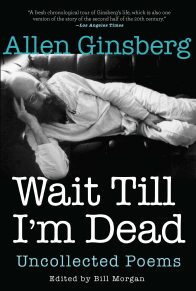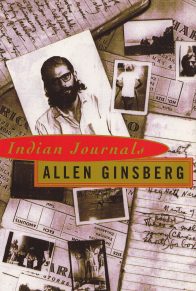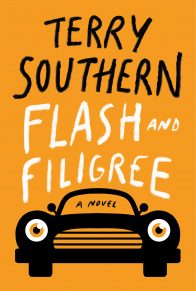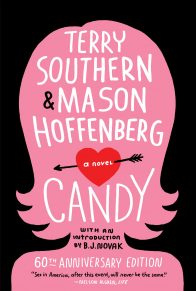Met me at the door; he said, gee I was just going out now. Going to a party, but come in, maybe you can go along? How are you now? I wondered if you had forgotten the alphabet, I said.
O I’m O.K. but the only thing (he said later) is this—my speech is slow.
Did you get to use my letter? I said. He: Have you seen Book 4? (He’d asked my ok to incorporate some letters to him as part of Paterson text.) O yes I used it, after I got your postcard–carte blanche. I used a few of them. I said: Really? He: Were you mocking me? I: No, why no. He: Did you get my card? I: No.
He: While you were sick. I: O yes, but I was sick in the hospital then. (I’d spent 8 months in N.Y. State psychiatric institute 1949 and not received post cards he’d sent.)
Riding to the party (“Party” was afternoon gathering at house of Clayton Hoagland, a Rutherford neighbor poet who worked on N.Y. Herald Tribune editorial page.), sitting on porch, introduced, Williams talking about his first long early poem like Endymion, liking Keats, read an enormous amount. That poem about prince born on foreign land, trying to get back home. Do we ever get home?
He: The more you go out, the more it seems like here—I’ve tried to get to know my own home territory—The more it seems like people and things I know . . . O yes, that Italian woman, reminds me of that lady I know on Cedar St. Try to wake her up (After someone says “nasty Cedar St. woman”) she’s conscious.
Talk about Auden at Church reading, invited me (WCW) out for drink. And talk about Spender as off beam, and uninteresting auto-biography. My own auto: I tried to write it straight. It’s not profound, just a story. How I fell in love with a pair of legs, a pretty pair of legs, that’s all. I wrote it out in long hand. I wrote fifty pages, finished it up like this after I got out of hospital (Points meticulously and stubbornly in the air before his eye to show how typewriting fumbling earnest he was to finish). My life is over, I’ve lived all now, my life is through now, why shouldn’t I tell the truth?
Interest in Southwest Indians. Talk about Mayans. Why write? Long disconnected failing conversation. It’s all to tell truthfully why people act like they do. (He sweeps arm) Everybody here, we know them, we are afraid to act like ourselves.
Long talk on couch about reason for writing—only by finding ourselves—
Description of Auden’s apt. Clutter and dirt, boy cooking food at other end of table. We had nothing to say to each other, except formalities.
Talk about meter, measure, etc. Sitting in garage in car at his home, him tired, now talking straight more: It’s a matter of time. Get local speech accents and rhythm, write in that idiom. I don’t even know if Paterson is poetry. I have no form, I just try to squeeze the lines up into pictures.
Liked Auden’s Nones. All the lines different rhythm, varied, clear thought, mainly all the lines (He holds two hands parallel placed in air) all different, with little variations in each.
My letters: I was embarrassed seeing them. First time I’ve ever been in print, I said. They are egotistical. He: Well, look at Stevens’ first letters, early letters to Marianne Moore.
I was up in the air then. He: Yes, you were. But that’s a thing about that, you can look back on it. When you’re a young man that’s how you are. A young man can’t think about anything but himself, that’s how it has to be.
Is it all right, the letters? O sure, I said, I’m pleased, delighted. It just looks strange. No great apocalypse to be in print. Is A. P. Allen Paterson? He: No, A. Poet. Maybe I should have put in your name? I’ll be sure to tell people. I said: I don’t get a cut out of this? He: O well, I’ll promise you a copy. Autographed? I said.
Long talk about next generation’s work: need to make some standard for the line. There is nothing written to the point, I said. You should, that’s necessary so that people like me won’t go looking for a pattern when there is none. Maybe I will, he said . . . Flossie, she’s tired. That’s how she is sometimes.
She said, Thank god the Yankees lost. Also, seeing me out, I’m sorry I couldn’t go, but I just can’t stand that kind of party.
April 17, 1952
Still at furnished room, once more in halls of Solitude I enter this notebook—
Broke my key last night so went around looking for place to stay, wound up at Bill Keck’s.
Big warm loft on 2nd Street—Bolt in door, shouted up, came down to let me in—sat down—”I’m glad to see you in your home,” he smiled & grimaced & said, “What am I supposed to say, I’m glad to receive you?” saying it.
Looked at his clavichord under construction, discussed Dolmetsch1 & Reich, and also “square hipsters.” Dolmetsch: a magic name under those conditions–the primitive harkening & evoking fellow magicians.
“What are you a black magician or a white magician?” I said.
“To order,” he smiled.
He spoke of God (in reference to peyote) and later I asked him (in the Jewish all night cafeteria around the block where we had vegetable soup that I bought, and macaroons & coffee & cakes)—”You spoke of God before: what’s that to you?”
“When the universal order seems organized–when everything I see seems to belong to one organism, when everything about me swings, together.”
Difference between T God & Peyote god:
“With T you are observing everything in unison order harmony swinging organized organism—with peyote you are part of it.”
He gave me, without my realizing it was sitting there beside us on the improvised table of a solid block of wood or box–three cones or buds of peyote: I was shocked and awed by their appearance—lifelike and large—cones or vortexes consisting of a seemingly alive vegetable.
They are ranged on the paper in front of me as I write: the most perfect is about 3 or 2″ inches long from tip to head; the tip & outer sheath of the cone to the head is made of a brown soft bark, as on a wrinkled potato type root or tuber. The head is chiefly astounding: it looks like dusty malachite in color: green that is perhaps bright, and if wetted goes deeper green—a center of white fuzz, like a fungus growth, and spotted in each section of the head, centered, a tuft of fuzz. The head looks like soft curvy rock; or like green martian flesh, wrinkled or creased: and the whole bud is soft under the surface, so that one dares not squeeze too hard for fear of injuring the plasm or animal. The bottom of the cone, or tip, is harder: the centre of the root seems most vulnerable. It apparently grows much larger; grows underground in the cone, with the head above the desert flatness gaping unreally at the sun.
One of the buds has a double root like a cactus. The last has tip cut off & looks injured & stunted, but center still good.
I was told to eat the pulp, peeling away top & bark & all rot parts from injury to head.
Hard to digest, so eat with milk or juice or especially with fruit salad.
I carried the god (small peyote god) around in my briefcase for 2 days wandering in New York, & saw the burning of the early Christian martyrs in Quo Vadis with Gene the next night.
He (Keck) said he read Lao-Tse–in 8 or 9 translations & finally began to get the drift—disliked Bynner translation, liked one in Yutang anthology (Waley). Said he liked poets like Whitman, Blake, Lawrence (didn’t know about Rilke), also had been awakened by Kenneth Rexroth as I myself by Rimbaud. Also liked one of Jeffers’ longer poems.
I noticed whiteness of dawn street, he noticed blueness of it.
His loft has a window on the stairway overlooking a cemetery–stairway dark & old & deserted, rubbish filled–3 flights in unused bldg. $15 a month rent pipes electric up from next floor, has candles also & kerosene lamp. Tacked on wall—Song by Moondog—
“I won’t go to your dark bed,
if I do there be many eternities
of night I’ll regret it”—a round.
Mail advertising circular from Magic Gardens, Laredo Texas. Pictures from newspapers & headlines on newspapers.
Feeling of Keck of awe and seriousness—
He rejected Vedanta & other self-dispossession type cures as bad—saw world itself as to be seen either way as in 1st verse (he mentioned) of Lao-Tse. Described & recommended St. John of the Cross’ dark night of soul.
Awe & seriousness & slightly sinister maniacal overtones as all subterraneans, but what quality of depths and mysteries unfathomed ever by me—
Can’t describe charm of such life & its objects of awe & contemplation—the glass bowl (blue) filled with steel wool (which broke up his cold he said) which holding to the ear I heard a dead silence of the void—robbed air of its infinite music & motion.
He put me up for nite on his couch—one cover (top) of which is a flag, Union Jack, he said. He came to bed later on, crawled in dressed. I slept far over in narrow couch on my side uncomfortable troubled by dreams of god fright and sexual battle between us—he perhaps wanting me (in my dream) to make love to him or we make love together, I resisting & rejecting him.
I came on very square, I am an old fool to these subterraneans.
Keck also read poems:
“Life is the graveyard
Life is the sea
Life is the lime green tree”
“Awe” poems. Used word eternity, referring to the sky.
Dream
With W C Williams at party in my family mansion—Edith my mother—thru the windows into the sun porch arboretum statue room I see bust of goddess? and statue of Hermes & Eros—and statue moves, Hermes is lifting Eros’ small boy’s marble white behind from his loins in a single gesture upward & outward (to shoulder?). Hermes had been fucking the child Eros. I want to go into sunroom to look closer—apparently statues say something, or some poem is written there, but mother objects—I’m crashing around well-arranged disposition of statue exhibits & flowers & plants & stems.
April 1952
We’re flowers to rocks. That was last nite’s note. Took Peyote at 8:30 AM—very unpleasant bitter metallic taste, I gagged at second chunk—the yellow insides. Worst part of peyote the metallic imaginary aftertaste & feeling of stomach sickness and heaviness of body, nearly nausea. I walked my father immediately to the corner, & lay down in bed.
After awhile, when sickness passed—first thing I noticed: eyes closed toward light leaves in eye a golden glow hue—which darkens when you pass hand over lidded eye. It made me feel like a very transparent sort of organism.
I noticed the pillowcloth (inside the white slip) was very beautiful pattern of yellow and green. Classic Russian primitive.
When the wind rushes thru the grass you can see the green grass vibrating on the brown ground.
I went to the window, looked at the Cherry Tree in bloom. (Menstruating cherry tree, Louis said).
I’m sitting outside under the tree.
“Heavens, the universe is in order” —It is a wonderful day, in the backyard. The sky is a solid light blue,–I look up at it and it appears the atmosphere of a planet, which it is—pretty white clouds, like static semen, floating very purposefully away in front of me to god knows what Gotter-dammerung of Clouds at the end of the world.
Of course, heavy feeling in stomach and bitter aftertaste.
I am like Cezanne, sketching; or Kerouac’s idea of prose sketching a personal originality of his.
I can’t stand the smell of my hands—ink which smells like metallic peyote tastes–only that nausea haunts me—I keep blinking my eye–my head is heavy and constricted—
This poor journal, which later will seem to be nothing—is now so much part of the world, that it seems to be sufficient—to put down only such sparse details—I would like to fit the whole world and its very solid and apparent mysteries here.
The great mystery is that of Being. It is a beautiful day, the houses appear solid and in miniature “open unto” the sky . . . Paterson backyard.
Everything is full of activity—a bee just dropped down on my page (which is light blue or greenish cast ruled lines).
There are flies and butterflies—I saw a white one before but the air is otherwise clear all the way up to the sky is “like a crystal”—it’s true air, space—space is a solid.
The houses around here seem so primitive, with their poor television antennae tacked on to the patched up chimney—
The neighbor next door, Dr. A—, comes up from his basement inside his house and says in a heavy voice,
“Dear, I feel as if I detect a slight odor of gas down here.”
Man so busily occupied sniffing out details of their amazing being that surrounds him on a spring sunny Sunday—I hate to even conceive of the weekly world and its rules, complexities, violences—lack of repose—involvement—I am after all looking only thru a plateglass window at the world.
The clank of garbage pails—a hollow sullen roar like that of a dog, calling attention to themselves, too–gaily—
The wind making noises at the top of the tree, laundry flapping in a tree of laundry too—the window-shade cord with the silly ring-holder at the bottom hanging & swinging in the open window.
I am merely looking up at details & noting them down as they come to my attention. But to turn the mind to something fixed and contemplate (I should like to go in and hear music—I started writing, and heard a burst of music from the ill-adjusted radio being turned on . . . then volume down)—
To contemplate that rock, for instance, that my mind? who? I imagined last nite suddenly in the dark—(the rock lasting longer than a man)
The world is full of strange noises, I turn on music which is the most strange—I’m walking around house at a mad pitch, doing things and writing—must go back to that rock–am at kitchen table now.
“Stream of consciousness”—the other (in books) is literary. But quite an interesting concept.
I have been going around grinning idiotically at people—almost afraid they’ll ask “What’s the matter with you this minute?” But they seem to me also—so strange in their momentary consciousness—M—reserved talking to her brother didn’t understand my intrusion: “What are you bothering with practical politics again?”—didn’t even understand my language.
Louis’s head characteristically peers from the back window. I nod and he withdraws.
Rock. Serried & worn by years, so old, a huge stone tear. I can’t even see you under your shroud of dirt.
A bird just shat on me! It must have been on purpose.
My father came to the door—I said, “You know what? A bird just flew by and dropped on me. I’m a victim of the birds out here”—he couldn’t hear and turned away.
Imagine being in the literal presence of one’s father.
The rock is grey and has a film of dust on it—can only shine pristine and pure in its nakedness when wet—or “polished”—which is why they polish poor stones–any stone when polished being beautiful. We should cut & polish large stones.
They are always interrupting me in my observations of the world with strident voices—”Please Allen, will you hang that up?”—a piece of laundry which had dropped on the grass. And I hear relatives’ honking mechanical voices in the house. My father says,
“He’s busy with himself,” just now—Am I attracting too much attention, just sitting in the backyard writing? How logically people act, yet how strange.
Language is very worn out—it is of necessity so abstract—a word like “strange”—when everything is strange it has no meaning.
I have a paranoid fear that every time I look up someone is looking out at me from the window—such a habit of self-awareness I have. Prison?
My thoughts are definite things left back in time—like 5 minutes ago—”Peyote is certainly one of the world’s great drugs.”
These mad appearances of differing faces in the back window–talking, looking out at the tree.
Today my family should all dance under the blooming cherry tree in the backyard—it really occupies their attention so much. And I love the cherry tree like a—It is so alone and stolid all year, no thought of its own, no way to talk! It must have amazing feelings this time of year—toward the tree, its lover, three backyards away, which pollinates it—yet it is now dropping buds on my head.
There’s nothing in the grave.
How terrible & agonizing it would be for all this motion & change in creating to be fixed, nothing moving. (All forms still & staring like flowers & fish in transparent plastic paperweight.)
I have to find, among other things, a new word for the universe, I’m tired of the old ones, they mean too many things from other times & people.
Also amazing how my real fixation on T or anything returns to this wonder at the world of solid substance & stops simply gazing at appearance, with scant regard for telos or final mechanics.
Does everybody have the same process going on? Of course I am too involved in politics, mechanics, and everything, but my attention—this is my sickness—is not fixed on anything . . .
However it strikes me that perhaps only I and Williams (W.C.) in a radius of miles around—stand so solidly on terra firma admiring.
Fixed smile on my face—throbs of pleasure at birds flying overhead in threes—Yet I am unhappy, I long for company of mind—body too—I should be with a lover now.
The silence in the middle of all this is so lonely—but then the wind came up and made noise—of course I could go in and talk to my family.
This is you understand (I’m speaking to Bill Keck now) a literal transcription of my thoughts as they occur . . .
I thought of sending him these notes before. I would like to write a poem. Divine Poem on the physical world.
Upstairs next door the women are dandling and combing the 2 year old girl’s hair. How she must be happy, with all that attention.
I am an old gossip over the backyard hedge with Dr. A—. No evidences of spiritual violence or cryptesthesia.
And finally the family bared its bones at the luncheon table—Louis complaining abstractly (hypothetical situations) about Sheila (step-daughter)—seeming to have a meaning, a lurking resentment undertoning his words, and Edith his wife sat by & interpolated arguments. And I took him head on, “You’re like a comic strip Poppa”—but the terrible serious jagged edge of his hysteria underneath obtruded thru the afternoon to an inevitable reality—and Edith afterward alone in the kitchen, so angry, almost weeping, with choked voice—
“Doesn’t he realize that only because I’m being easy to get along with—it’s the only thing that keeps us together—”
And my stunned realization of our weakness—at the terrible portent.
She says she will blow up soon, and I encourage her to express herself—
“He’ll back down. He’d have to be crazy not to”—
The words of her and me taking terrible portent in the middle of the radiant Sunday afternoon—all Creation about us glistening—and the mysteries of the wellsprings of family revealing themselves—
Louis was complaining again about Telephone, about girls not coming right home & helping mother after she comes home from work—
Johnnie Ray—the circus hysteric act—the living wonder, the agonist with open heart–beautiful man they say showing his wound his tortured soul.
The great structure opening like a hysterical flower of Perez Prado’s Mambo No. 5—the zigzag structure of the massed trumpets punctuated by ripples of the drum, held floating notes, voices, rattles, gourds, primitive sound; suddenly the blare of precise fugues of the trumpet chorales building to a screetch of power—suddenly halted with subtle rhythms drumbeats finishing off—
Anything, anything, there’s so much to say from the bottom of the heart—but not say in open”—people really can’t stand much reality—or me, hate to think of anyone talking back to me.
What kind of secret organization of the feelings did I go thru today? (It’s 6:30 PM) only a few more hours to go.
Peyote is not God—but is a powerful force—can see, if everybody on, how they would organize their lives once every year, communicating with each other—what spiritual violence that day—what secrets revealed—family secrets, not big mystical riddles, which are after all palpable & easy to see just by staring outward into the obvious infinity of the sky—
Which is a thought I’ve never covered properly. Some subject to attempt:
It occurred to me early, and is a persistent thought of mine: . . . problem of matter & infinity & origin of Creation to be assessed & thought into without the aid of reason or science, but with the inner imagination . . . impasse of imagination . . . returns the mind to the fact that looking out into the sky see the solid endless heaven existing out there . . . going up from us (our glance) endlessly. What can you do with such a fucking universe? So this process of thought will never comprehend—for the necessary peaceful minute—the reaches of the Cosmos.
When the mind reaches that solid impossible wall it knows it’s off in a meaningless series of ideas & must return—Jazz & music reaches that moment of peace—end of thought.
Much work to be done on sequence & structure of thoughts—actual occurrences—and not synthetic thoughts pieced together from fragments—but the relation of fragments.
Joyce is great—working with basic material of thoughts, not saying anything else, but presenting typical sequence in totality—which is all we know or can write down anyway.
Peyote very similar to T except that thought is, while futile, less distorted and impossible to capture for the moment than on T, and substance seems very solid.”













